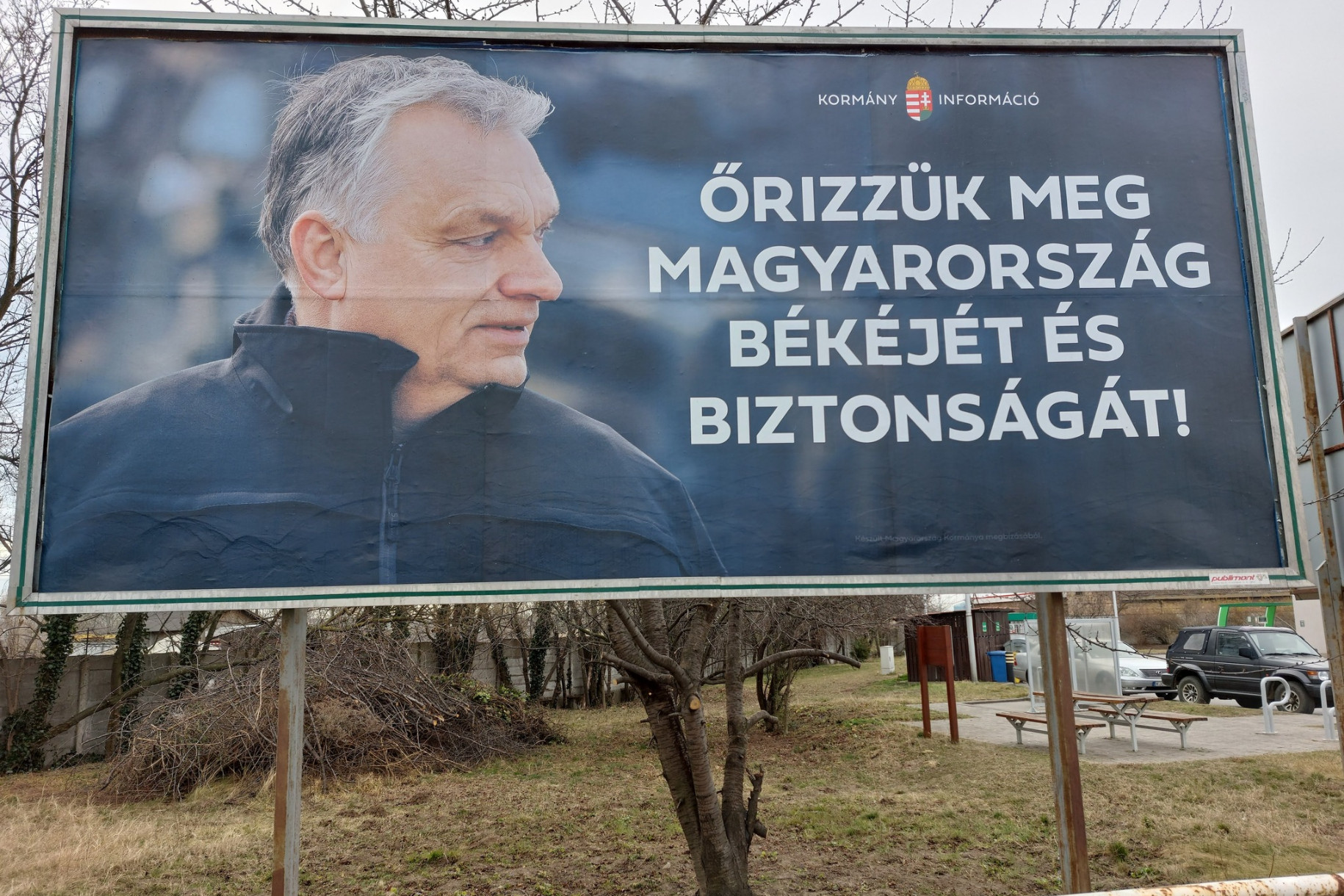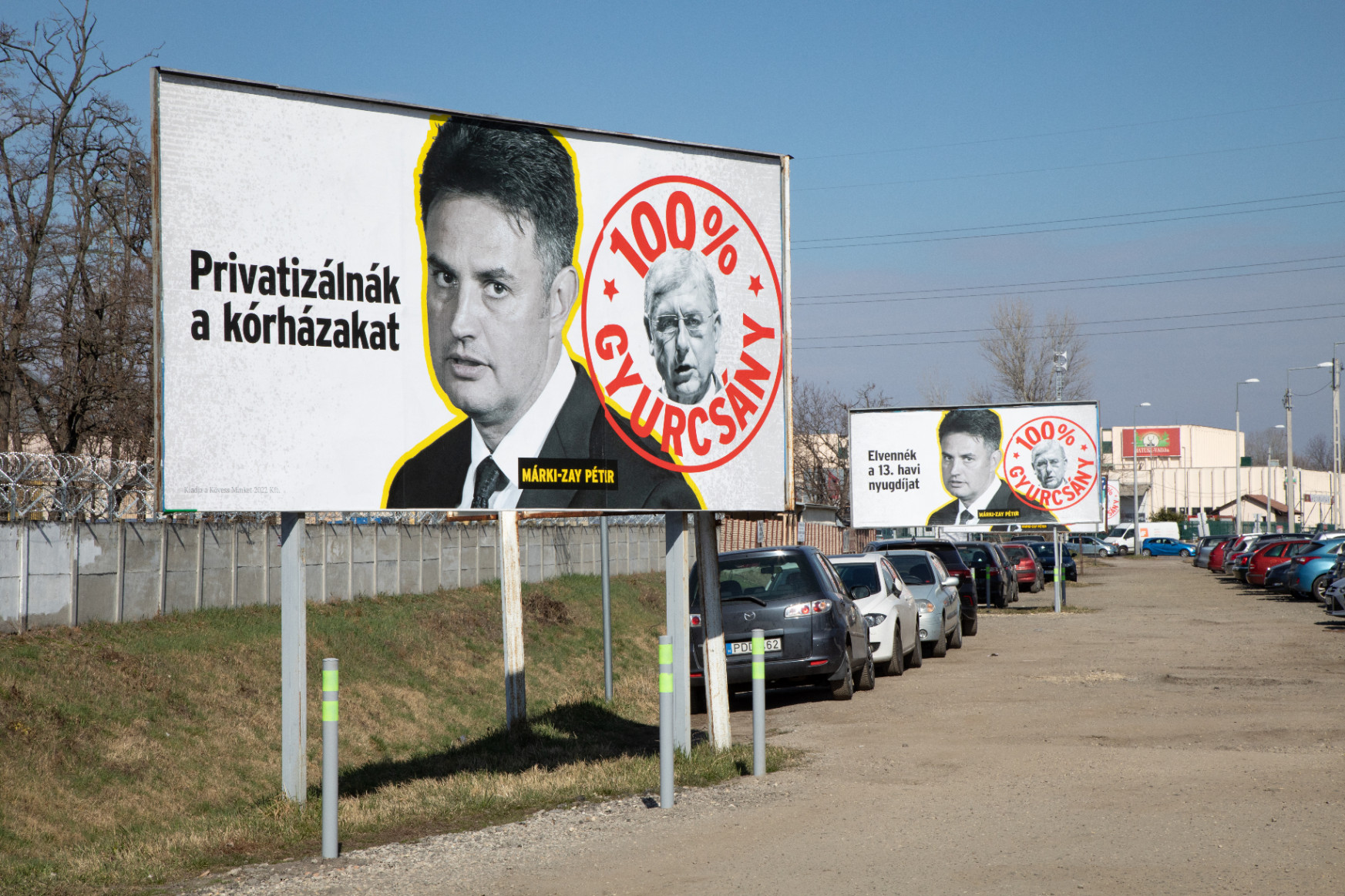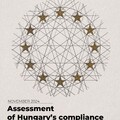After a 50-day official campaign period, general elections were held in Hungary on 3 April, and FIDESZ, in government since 2010, won a supermajority for the fourth time. The election results are hardly surprising given the government's gravity in campaigning. K-Monitor's analysis considers the three main pillars of the state influence: the utilization of public funds or public offices for campaigning, the direct use of state funds for campaigning during the election campaing and the decisions of the state bodies assigned to monitor the fairness of elections.

"Let us preserve Hungary's peace and security!" - state funded billboard during the election campaign. Photo: Nagy Attila Károly / RTL.hu
To map campaign spending, K-Monitor conducted research with three main pillars. From the beginning of the campaign period until 31 March, K-Monitor identified 200 cases where candidates had tried to increase their political base by using public funds or public offices. Decisions of the state bodies assigned to monitor the fairness of elections were also analyzed. In cooperation with TI Hungary and Political Capital a flash report has been published on outdoor advertising in Hungary’s election campaign.
K-Monitor is an independent Budapest-based anti-corruption watchdog. Support us!
In this post, K-Monitor summarizes the most important findings related to the use of public resources during the 2022 general elections. At the outset, it is important to note that the campaign started well before the official campaign period, and the governing party has deliberately allocated public bodies and resources to serve its campaign.
Looking at the shaky cases published in the press, two general observations can be made. The first, perhaps less surprisingly, is that it was usually the campaigns of government’s candidates in battleground districts that received the most backing from government sources. According to cases covered by local and national news outlets there are at least 5 cases in 6 districts, 4 of which in 2018 the pro-government candidate won by a narrow margin. The other fact is that in 4 of the same 6 districts (but not in the same 4) Fidesz-KDNP was running a candidate who is not currently an MP. The significance of this fact is that the control bodies responsible for overseeing the elections typically reject complaints to such cases on the grounds that the candidate is currently a MP and must carry out their duties during the campaign period, of which these cheerful events are part.

György Popovics (Fidesz-KDNP), Chairman of the General Assembly of Komárom-Esztergom County, Judit Czunyiné Bertalan, Candidate Member of Parliament for the 3rd constituency of Komárom-Esztergom County, András Veres, Bishop of Győr, Miklós Soltész, State Secretary for Ecclesiastical and Ethnic Relations of the Prime Minister's Office and Mayor Zoltán Sinkovicz (Fidesz-KDNP) are cutting the ribbon of the renovated parish building of Kisbér on March 13, 2022.
Photo: MTI / Csaba Krizsán
Candidates were keen to solemnly open renovated or new schools but events for the handover of roads were also popular among politicians. Several village and parish halls were opened, but local candidates also went out to cut the ribbon on private projects stuffed with public funds. Campaign speeches were also given at memorials for the Revolution of 1848 organized by local governments. There are also several examples of mayors campaigning by mail for the FIDESZ candidate. In addition, a lot of GONGOs and government backed NGOs openly campaigned for the government candidates.
What Have the Bodies Responsible for the Fairness of Elections Done?
Campaign at the State Commemoration for the Revolution of 1848
A complaint lodged with the National Election Commission (NEC) alleged that PM Viktor Orbán mixed up his role as head of government with that of the party's president during his public speech on 15 March, aired live on the public broadcaster, by using his speech at a state commemoration to promote the party, thereby engaging in campaigning on the state payroll. The NEC, mainly consisting of party delegates, rejected the complaint on the ground that it had not been proved who was the organizer of the event, therefore, it was not possible to trace back a breach of election law.
Information in the Public Interest
The flash report of NGOs shows that pro-government forces have spent almost eight times as much on billboard advertisement in the ongoing Hungarian election campaign than the opposition. Fidesz itself seems to have violated the spending cap of HUF 1.177 bn, just with its billboard ads worth HUF 1.4 bn on list prices. Altogether pro-government forces have spent HUF 3 bn on outdoor ads in March. A citizen tried to challenge the so-called `government information campaign’ that had made PM Orbán’s face visible on almost every public premise in the last weeks (453 posters for HUF 112.242.000 only in the first half of March). The NEC was of the view that the government
‘did not formulate a message on the substance of the election campaign, but expressed itself solely on a public issue.’
There was no violation.
The same deferential logic was also upheld as justifiable by the Hungarian Constitutional Court (HCC), by now, only composed of FIDESZ appointees. During the pandemic, the government installed a newsletter service in the context of the official registration for vaccination. The service could be subscribed upon consenting a privacy statement with a vague wording regarding the purpose of the newsletter. Even though the newsletter was sent only on COVID-19 related matters in 2021, the contacts collected by the registration seemed to be a useful tool for campaigning too as this March the government started to send the newsletter highly unrelated to the epidemic but on current matters in everyday politics. Even though the Kúria, which is the highest court in Hungary, found a violation in the case of government newsletter blaming the opposition for supporting the weapon transport to Ukraine, the HCC overturned the judgment and gave a green light the government’s online campaign as it just
‘fulfilled its duty to inform by its communication activities.’
Arguments challenging the use of email addresses for purposes out of the context of the pandemic were also rejected without examination as data protection concerns fall out of the scope of the election law. Later, such a complaint was also turned down by the National Authority for Data Protection and Freedom of Information as moot.
Public Funds and EU Money: ‘Communicating Success’
Many have criticized the use of EU or public funds serving to justify government candidates' success. The NEC showed empathy to this kind of activity. ‘Communicating success’ can be justified as
‘(...) it is generally taken for granted that any result that is linked to the political community (such as the government party) of which the candidate is a member will be mentioned by the candidate as an own success. This does not, except in extreme cases, in itself constitute a breach of law.’
For example, a church renovation financed by a state fund was the subject of a campaign video for a governing party candidate. The video was challenged on the grounds that the use of state funds could not be considered an achievement of politicians of one party. The NEC dismissed the case since the incumbent MP, who was running again, voted in favor of the laws which were a prerequisite for the development.
Double-Faced Government Officials
Events at nurseries were popular among candidates. In Fót a FIDESZ candidate was criticized for handing over a sports field for preschoolers together with the local mayor. The ceremony accompanied by small children was reported in the local press. The person concerned was not only a candidate but also an incumbent MP and a state secretary. The NEC ultimately concluded that the MP was acting only as a state secretary and not as a campaigning candidate:
‘(given the) political nature of government activity, it would be wrong to conclude that a public body cannot act in an institution of public education. (...) a candidate's function as a state secretary cannot be considered as an activity with a political purpose that can be associated with a party.’
The handover of EU-funded laptops in schools raised similar concerns. Neither the NEC, nor the Kúria, nor the HCC found a violation with a state secretary distributing IT stuff in the company of a candidate - and then publicly promoting this on Facebook. The state secretary was ‘only’ carrying out his duties in charge of public education. Since there was no party symbol, logo or campaign slogan, no violation was found.

Photo: Vitályos Eszter's Facebook page
Involvement of Municipalities in the Campaign
In a district of the capital, a publication was dropped in mailboxes in the name of the district's mayor. The magazin demonstrated the local developments, also portrayed exclusively the district's incumbent MP, in a positive light. The NEC in its decision referred to legislation that is, unfortunately, rarely taken seriously by public bodies: stating that the FOI Act requires local authorities to publish certain information of public interest. According to the NEC, the mayor was only fulfilling his duty stemming from FOI when distributing the magazin. As the design of the publication or the slogans used in it would not be consistent with the elements used in rerunning MP’s campaign, there was no violation.
Only ‘information’ was disseminated in several villages in Győr-Moson-Sopron county, where mayors wrote in an organized way during the campaign period about the incumbent MP, who was running again in the constituency. The mayors informed the public that ‘hundreds of millions of forints worth of government support’ have arrived in the area thanks to the MP. The mayor's letters also hinted that the municipalities might lose money if the MP was unsuccessful in his re-election. When examining the cases, the NEC took the permissive position saying that
‘the letter shows that the mayor outlined to the electorate his thoughts and his political plans for the future, based on his experience of the past years.’
It did not see any evidence that municipal funds were used to write and deliver the letters either.
Local newspapers are an effective means of reaching voters. A complaint was submitted stating that a local newspaper receiving public funds presented the incumbent MP in several articles, while the activities of other candidates were not shown at all. The NEC dismissed the case in part on the grounds that the paper concerned was published one day before the official campaign period. As the campaign period started only the following day, there was no violation.
However, there were some cases where the NEC saw problems. Mayors belonging to the opposition defended themselves in vain by saying that they were only having a summit and discussing the matter of self-governance in a city hall. Even though they had not had party logos and other campaign elements, the NEC declared a violation as the electoral law prohibits campaign events in public buildings.
GONGOs in Action
GONGOs such as CÖF released several billboard ads, which showed Péter Márky-Zay, the chief candidate of the united opposition as a foreman of Ferenc Gyurcsány leader of the biggest opposition party Democratic Coalition, who became the bogeyman for Fidesz after a disastrous period as prime minister. The smear campaign was clearly in line with and in the interest of the government’s communication. This kind of hidden financing of the government’s campaign was challenged before the NEC. But the petitioner showed in vain that the GONGOs are state-funded, therefore, they carry out pro-government political activities, the NEC rejected the case declaring lack of competence. Such problems might only be complained about to the State Audit Office (SAO), the NEC pointed out.

CÖF billboard ad featuring opposition PM candidate Péter Márki-Zay with the denied allegation that he would privatize Hungarian public hospitals. Photo: Hevesi-Szabó Lujza / Telex
Non-Existing Social Media
A similar conclusion has been drawn by the NEC in complaints concerning Facebook ads commissioned by third parties in the interest of candidates. Pursuant to its understanding, problems in campaign financing are of no relevance from fairness in elections. There are two other state bodies dedicated to checking these abuses: the SAO and the Hungarian State Treasury. This interpretation of competence was confirmed by the Kúria and the HCC as well.
K-Monitor cannot contest the SAO and the State Treasury are the authorities competent for overseeing campaign expenses. However, both bodies are insufficient for tackling misuse of public funds. The first reason for that is that they are either officially captured by or subordinated to the government. The second reason is that the black letter law gives some limited competencies only after the elections take place and when the candidates are required to issue a report on their spendings. And thirdly, the SAO voluntarily narrowed the scope of its own authority, for example in the cases of ads on social media, which are not considered as political ads in the sense of campaign law. Consequently, a post-election accounting barley can offer a recourse for an election where funds were used illicitly. Unfortunately, the situation has not improved in recent years. This year, OSCE rang the bell again and highlighted many problems regarding the work of the SAO.
Powerless State Bodies - Or Not?
Permissive practice did not emerge in this year's elections but much earlier. Court decisions dealing with the campaigning of MPs running again or even of government officials have essentially widened the scope for misuse. The trend is particularly strong since 2019. In a decision, the Kúria analyzed the principle of the state's neutrality in detail. The high court concluded that Hungary's Fundamental Law does not require state bodies, which are not neutral per se, to be neutral in election campaigns.
However, there are two important elements that show that public authorities can step up and punch hard, but only if the government’s interests require.
As a result of a 2019 amendment to the law on the HCC, government bodies are now entitled to appeal to the HCC if they feel that a court decision has violated their ‘fundamental rights.’ This was therefore the first general election in which the government was able to test its standing and to lodge a constitutional complaint in election cases. The decisions of the HCC presented above confirm the fears of those who had believed that the body captured by the government would overturn judgments considered to be against the interests of the ruling party. The Kúria’s decisions on the government's COVID-19 data collection, which found the government in breach of the law, were annulled by the HCC upon a submission of the Prime Minister's Office. After the decisions, the President of Kúria - appointed and elected by FIDESZ - András Varga Zs. took a highly unusual step and issued a press release to assure the public ‘(t)here is no battle between the Kúria and the Constitutional Court.’
The NEC has also shown strength in another field. It imposed fines on all human rights organizations that called successfully for spoiled voting in the anti-LGBTQ referendum held at the same time as the general elections. According to the NEC, the NGOs exercised their right not in a proper way as they tried to hinder People’s will to prevail. One of the fines was upheld by the Kúria.
Címkék: english
Szólj hozzá!
A bejegyzés trackback címe:
Kommentek:
A hozzászólások a vonatkozó jogszabályok értelmében felhasználói tartalomnak minősülnek, értük a szolgáltatás technikai üzemeltetője semmilyen felelősséget nem vállal, azokat nem ellenőrzi. Kifogás esetén forduljon a blog szerkesztőjéhez. Részletek a Felhasználási feltételekben és az adatvédelmi tájékoztatóban.





